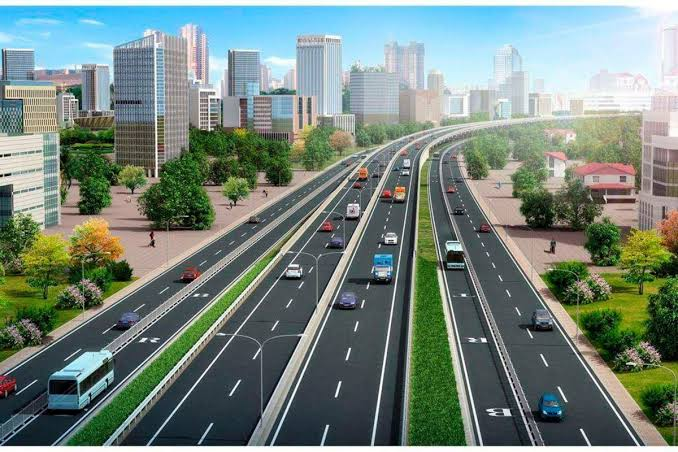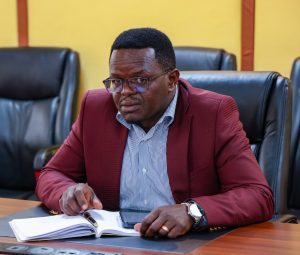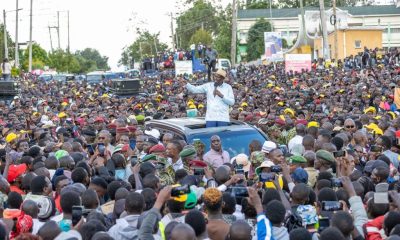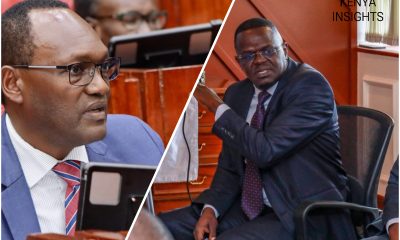Business
KENYANS ARE BEING SHORTCHANGED! LOBBY GROUP CALLS OUT PPP DIRECTORATE BOSS SEDA, KENHA OVER RIRONI-MAU SUMMIT PROJECT
“It is the ordinary citizen, the wanjiku, atieno, nekesa, chepkurui, who will ultimately carry the burden of these profit-driven roads,” MAK declares in its hard-hitting statement.

The Motorists Association of Kenya has unleashed a blistering attack on the government’s handling of the Rironi-Mau Summit highway upgrade, accusing PPP Directorate boss Kefa Seda and the Kenya National Highways Authority of orchestrating a massive betrayal that hands over a vital public artery to foreign profiteers while saddling ordinary Kenyans with decades of hidden debt and inflated costs.
In a fiery statement that has ignited public outrage, MAK Chairman Peter Murima declared the entire PPP scheme a grand deception, designed not to build roads but to enrich Chinese firms at the expense of taxpayers who have already footed the bill through years of fuel levies and taxes.
This is no ordinary infrastructure project, Murima thundered, but a calculated surrender of Kenya’s sovereignty, where the Northern Corridor, the lifeline connecting Mombasa Port to the hinterland, risks falling into foreign hands under the guise of development.
Digging into the roots of this scandal reveals a plot that stretches back 15 to 20 years, when former Roads Cabinet Secretary Michael Kamau allegedly kickstarted a scheme to replace toll roads with a uniform Road Maintenance Levy Fund, only for powerful lobbyists to deliberately stall the A8 upgrade since 2009.
MAK insists that if KeNHA hadn’t dragged its feet, Kenya would boast a modern highway today, funded entirely by public money and free for all users. Instead, citizens are now staring down glossy presentations of dual carriageways that mask a 30-year concession to private operators, with tolls starting at a shocking Sh8 per kilometer and escalating annually by 1 percent.
For a single trailer hauling goods one way, that could mean an extra Sh20,000 in fees, costs that transporters will inevitably pass on to consumers like Anyango and Chepkurui, trickling down as higher prices for everything from maize to medicine. And the numbers are staggering: the preferred bidder, a consortium led by China Road and Bridge Corporation alongside the National Social Security Fund, stands to rake in a jaw-dropping Sh339.8 billion in profits over the concession period, all while Kenyans pay through the nose for a road they’ve already financed via the Road Maintenance Levy Fund, now bloated to Sh25 per liter of fuel the highest in the region.
What galls MAK even more is the blatant falsehoods peddled by Seda and KeNHA about alternatives.
They claim non-toll routes will be mapped out for those who opt out, but MAK exposes this as a sham, pointing to the tolling policy that explicitly prohibits competing roads to ensure the project’s financial viability.
How can there be choice when the construction hijacks existing public land, forcing motorists into a coercive paywall? Companies like Bechtel and Usahihi wisely walked away years ago, spotting the ethical minefield of building on taxpayer-funded infrastructure, yet China persists, driven not by altruism but by geopolitical ambitions under its Belt and Road Initiative. This isn’t partnership, MAK argues, it’s predation, echoing debt traps that ensnared Sri Lanka’s Hambantota Port and Uganda’s Entebbe Airport.
The association reviewed the fine print and confirmed the devilish details: guaranteed minimum traffic volumes, step-in rights for the government if things go south, and revenue assurances that quietly shift billions in liabilities back to the public purse, all denominated in foreign currency to boot.
Government defenders, including Seda, counter that PPPs are essential given Kenya’s debt-to-GDP ratio hovering at 64 percent and the road sector’s desperate need for Sh4 trillion over the next decade.
He portrays the model as a savvy risk transfer, where the private sector handles design, finance, construction, operation, and maintenance for 30 years before handing back a pristine asset. Tolls, he says, will be ring-fenced for safety patrols, lighting, and emergency services, with excess revenues flowing back to the state. KeNHA echoes this, promising transparency and mapping free alternatives from Rironi to Mau Summit, insisting users will save on time, vehicle costs, and lives amid the current chaos of snarls at Salgaa and Rironi.
Transport Cabinet Secretary Davis Chirchir even posed the rhetorical question: isn’t Sh600 to zip to Nakuru in two hours better than grinding through four-hour jams?
But MAK dismisses these as slick sales pitches, highlighting how the project ballooned from initial estimates, with capital expenditure now at Sh193.4 billion and life-cycle costs adding Sh97.6 billion, financed through 75 percent debt that could haunt future generations.
The timeline only fuels suspicions of foul play. President William Ruto hyped a November 2025 start, but KeNHA now admits construction won’t kick off until 2026 at earliest, pending PPP committee approval amid ongoing negotiations.
A previous French deal crumbled in May over affordability woes, yet here we are, courting CRBC, a state-linked giant whose involvement MAK sees as entrenching economic dependency.
Exponential vehicle growth, documented by the Kenya National Bureau of Statistics, should have prompted public-funded expansions decades ago, not this rushed pivot to privatization.
MAK’s call is clear and urgent: suspend the deal immediately, publish all agreements and feasibility studies, audit the Road Maintenance Levy Fund, and launch a national dialogue on tolling. Why rush into ceding control of the Northern Corridor, they ask, when a fraction of the Sh600 billion in wasted public funds could upgrade it outright? Motorists could even fund it through a special agreement with KeNHA, proving this isn’t about scarcity but ulterior motives to control port access and cargo flows.
As outrage builds on social media and beyond, with posts decrying the Sh8 per kilometer as outright robbery, the Rironi-Mau Summit saga exposes deeper fissures in Kenya’s infrastructure governance.
Will Seda and KeNHA heed the warnings, or plunge ahead into what MAK brands a betrayal of the social contract?
For now, ordinary Kenyans the wanjikus, atienos, and nekesas are left wondering if their freedom of movement is being auctioned off to the highest foreign bidder, one toll at a time.
Kenya Insights allows guest blogging, if you want to be published on Kenya’s most authoritative and accurate blog, have an expose, news TIPS, story angles, human interest stories, drop us an email on [email protected] or via Telegram
-

 Investigations1 week ago
Investigations1 week agoBillions Stolen, Millions Laundered: How Minnesota’s COVID Fraud Exposed Cracks in Somali Remittance Networks
-

 News1 week ago
News1 week agoUS Moves to Seize Luxury Kenya Properties in Sh39 Billion Covid Fraud Scandal
-

 Investigations1 week ago
Investigations1 week agoJulius Mwale Throws Contractor Under the Bus in Court Amid Mounting Pressure From Indebted Partners
-

 News1 week ago
News1 week agoMAINGA CLINGS TO POWER: Kenya Railways Boss Defies Tenure Expiry Amid Corruption Storm and Court Battles
-

 Business2 days ago
Business2 days agoEastleigh Businessman Accused of Sh296 Million Theft, Money Laundering Scandal
-

 Americas1 week ago
Americas1 week agoUS Govt Audits Cases Of Somali US Citizens For Potential Denaturalization
-

 Business2 days ago
Business2 days agoEXPLOSIVE: BBS Mall Owner Wants Gachagua Reprimanded After Linking Him To Money Laundering, Minnesota Fraud
-

 Business2 days ago
Business2 days agoMost Safaricom Customers Feel They’re Being Conned By Their Billing System





























